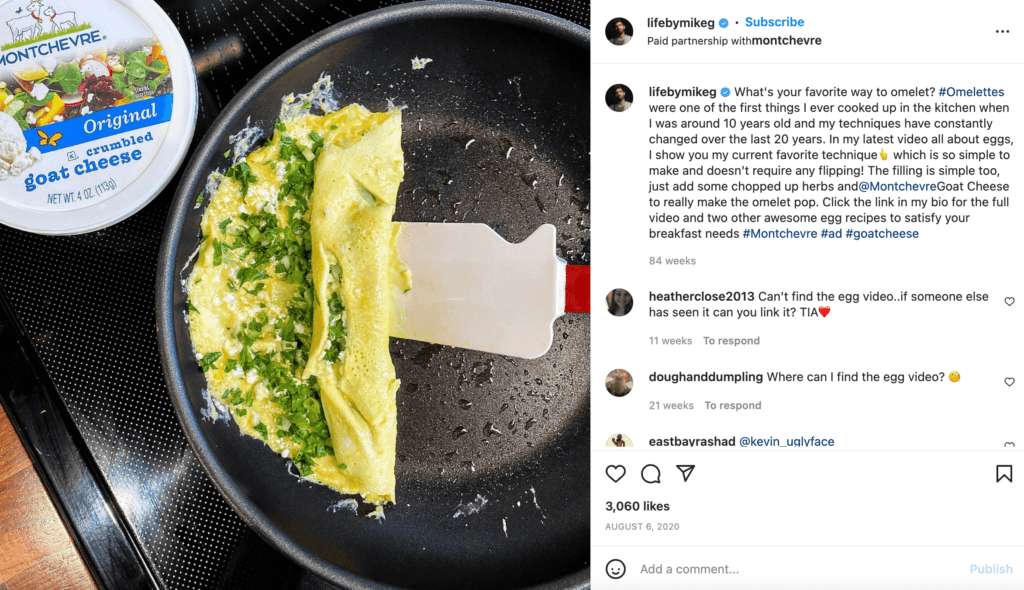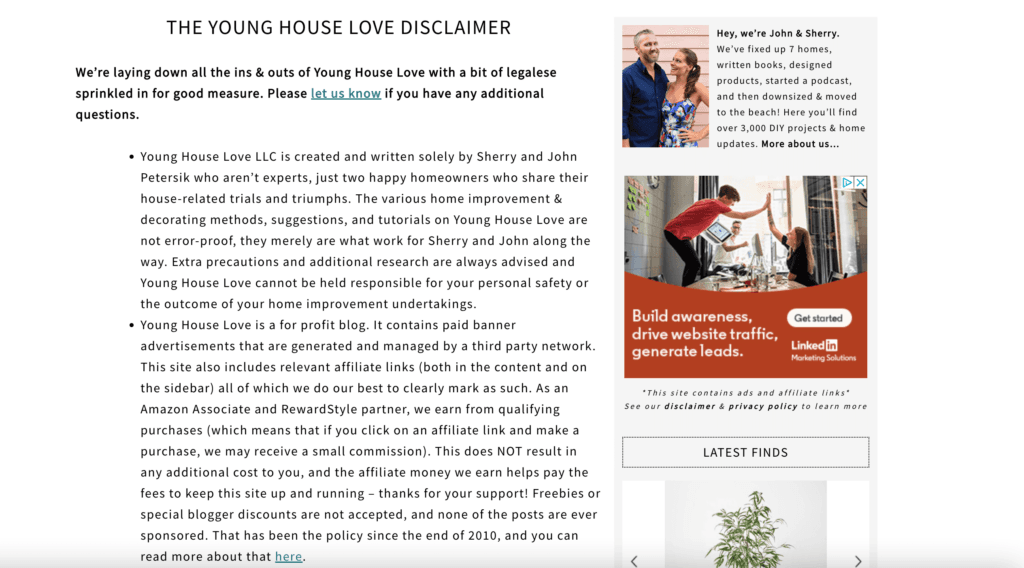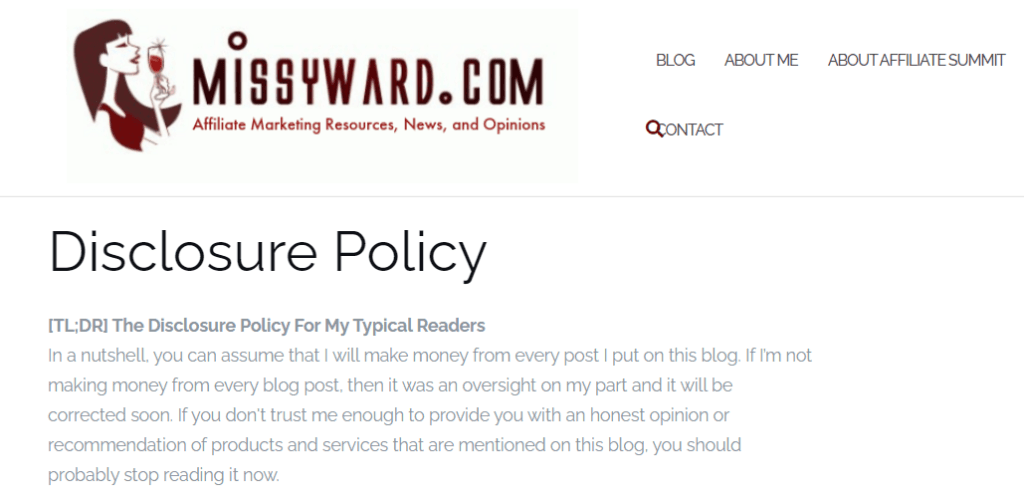Contents

Affiliate marketing is an excellent way to make money online or monetize your blog. However, you'll also need to think about affiliate link disclosures, which can seem a little daunting and unexciting.
Fortunately, these disclosures don't need to be boring. Once you know the guidelines, you can try to create unique disclaimers. There are ways to abide by the law while still keeping your copy interesting and remaining true to your brand.
In this post, we’ll discuss what an affiliate link disclosure is, and why it’s vital to have one. Then, we’ll give you some tips for creating an interesting disclaimer. Let’s get started!
What an Affiliate Link Disclosure Is (And Why It’s Important to Have One)
An affiliate link disclosure informs readers that if they purchase a product through a link on your page, you might earn a commission from that sale. This is a legal requirement by the Federal Trade Commission (FTC), an independent agency of the US government that enforces consumer law. Additionally, affiliate programs such as Amazon require you to provide a disclosure.
An affiliate link disclosure helps maintain transparency and build consumer trust. If you don't disclose your relationships with brands, you risk being fined. It could also harm your reputation and business.
Your disclaimer should clearly explain that you are compensated for any purchase made through the link. Essentially, the two principal things you need to do are identify the affiliate link in your content and explain what it does for you.
How to Write a Unique Affiliate Link Disclosure (4 Tips)
Affiliate disclosures can seem unexciting, but they don’t have to be. Although adhering to legal matters seems stodgy, there are still ways to make your disclaimers unique.
With that in mind, let’s take a look at how to adhere to endorsement guidelines while remaining true to your brand.
1. Align the Message With Your Brand
As you do with all other marketing tactics, you'll want to align your disclosure with your brand. You can do this by subtly incorporating the message into your post.
In the following social media post, Instagrammer Mike Greenfield starts off with an anecdote about how omelettes were one of the first things he ever made in the kitchen, which is very pertinent to his culinary brand. Then, he transitions to his disclaimer by using the hashtag #ad along with the Montchevre brand:

Leveraging your disclaimer to align with your brand can help ensure that your audience won't be thrown off. You can be creative by integrating a personal story into your post, all while keeping your disclosure message on brand and adhering to US law.
2. Be Honest
Readers can often tell when you’re not being truthful with them. Trying to hide the fact that you're making money off of them could hurt your image. Therefore, you'll want to be honest with your followers by clearly stating that you earn commissions.
It is possible to be original and honest at the same time. For example, the content creators at The Young House Love start their disclaimer with a statement of who they are and what they do:

Then, they explain that they run a for-profit blog that contains affiliate links. They clarify where the links are (in the content and on the sidebar), and that they may gain a commission at no extra cost to the visitor.
This kind of honesty can help you build trust with your audience. This may in turn lead to more affiliate sales.
3. Keep It Clear
Keeping your message clear will also help you stay on brand. Ambiguity will confuse your audience, so it's important to be upfront about your affiliate income while keeping it interesting.
There's no need to complicate your message – your disclosure can be short and simple:

Additionally, you'll want to make sure that your affiliate links are neat and clear. Using long URLs can detract from the clarity of your message.
Our ThirstyAffiliates plugin can help you clean up your links. It enables you to cloak long and messy affiliate URLs, and easily insert them into blog posts:

Using a clear, short message will help your audience understand how affiliate marketing works. It can also help avoid any misunderstandings and potential complaints.
4. Show Your Personality
If your blog or site has a light-hearted tone, you can try to inject some humor in your disclaimer. You don’t have to go for a stiff, cookie-cutter disclosure. Instead, you can let your personality shine through by writing unique copy in your own voice.
A great example of this is Missy Ward's disclosure page:

The blogger's blatant honesty — which she uses throughout her site — is on brand and fits with how she presents herself and her business. She doesn't shy away from using her personality in her disclosure, which augments her brand tone and adheres to FTC guidelines in one flawless package.
Conclusion
Affiliate disclosures are a necessary part of affiliate marketing, but they don’t have to be boring. In fact, you can leverage your disclaimer to be unique and even help promote your product or service.
You can get creative with your affiliate link disclosure by:
- Aligning the disclosure message with your audience.
- Being honest about your earnings.
- Keeping your message clear to prevent confusion, and use a plugin like ThirstyAffiliates to create clean links.
- Showing your personality by using humor.
Do you have any questions on how to create an innovative affiliate link disclosure? Let us know in the comments section below!
If you liked this post, be sure to follow us on Twitter, Instagram, Facebook, Pinterest, and LinkedIn! And don't forget to subscribe in the box below.



I think Missy Ward’s disclosure policy is well written. But alot of the times a simple disclosure policy is all that’s needed. I’ve found that some people don’t even care that you earn a commission on some of the links in a blog post. If the information is good and they trust you, a simple disclosure policy is all that is needed.
Hi Will,
As long as the disclosure meets the requirements (as for Amazon), does it really matter what the wording is? Who reads these anyway? It’s just a legal thing.
Tx for the article !
As long as the disclosure meets the requirements (as for Amazon), does it really matter what the wording is? Who reads these anyway? It’s just a legal thing.
Hey,
The information you have provided in this blog is very useful for many people like me. Please keep writing these kinds of content in near future.
I understand this topic very briefly
Hello. Thank you for creating this. Excited to dig in and start learning
Thank you! I was considering creative ways in which I could write a disclaimer and this article helped.
This is awesome info. Thanks, dear. I have been looking for a resource like this.
We appreciate you for creating this. Excited to dig in and start learning
Wow! Extensive library! This will be a great resource for our team’s development. Thank you
Wow, this is mega resource! Thanks!
Maybe you can use an AI writer to generate Affiliate Disclosure. AI writers are lot better at generating content than most people think
your blog is very informative and intersting.
Thanks for giving us tips on how to write a unique affiliate link disclosure